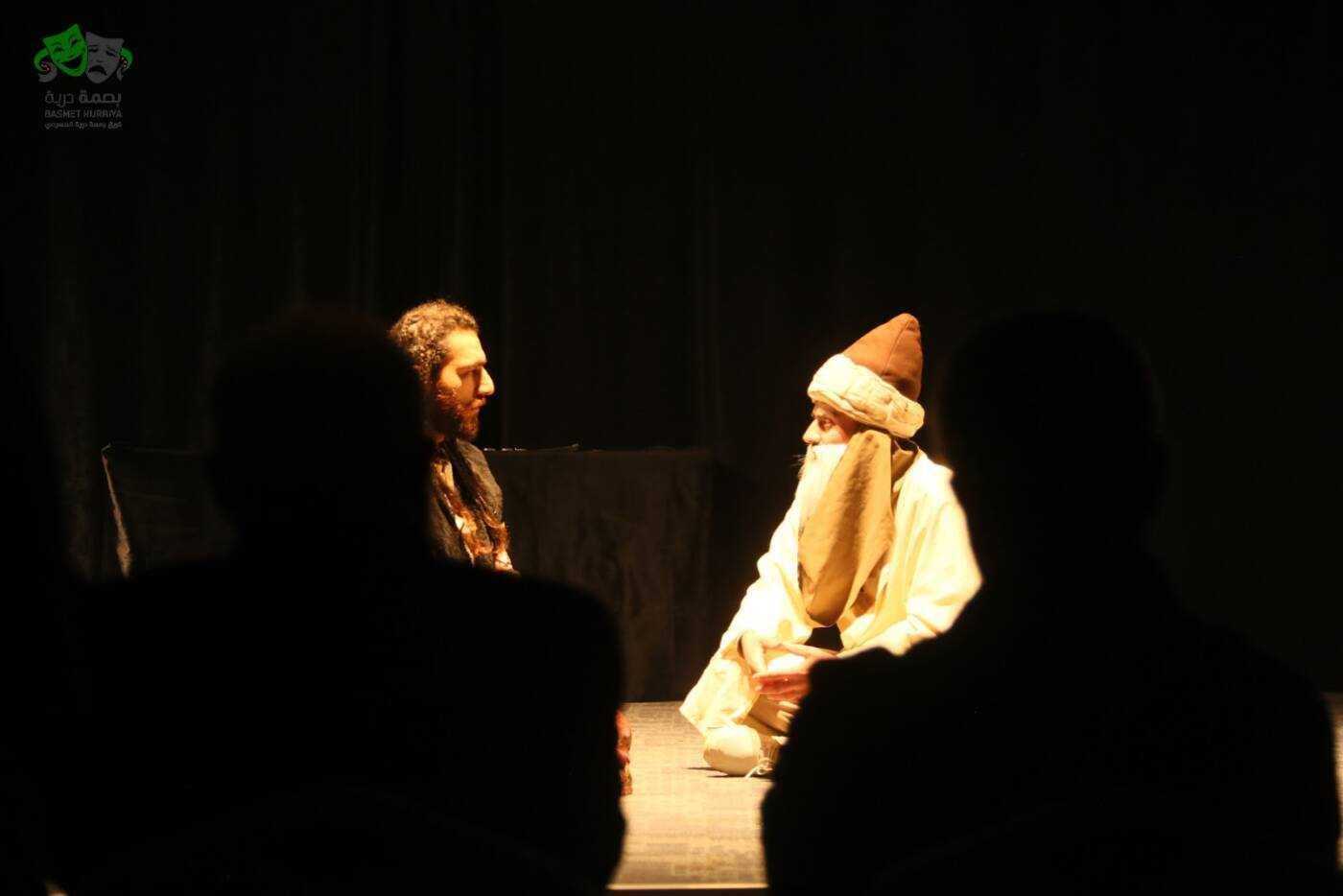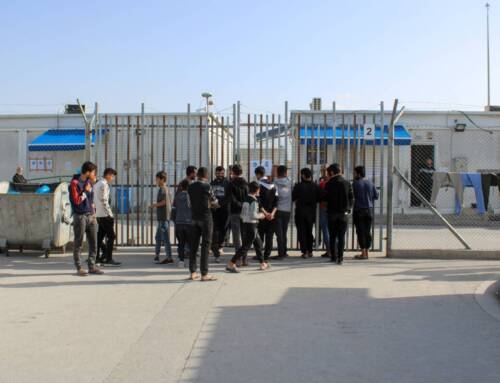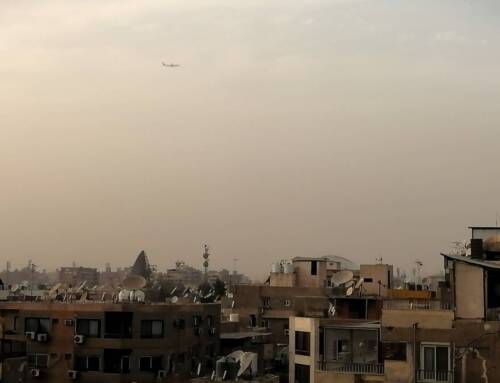Self-supported actors work to promote a theater culture in northwestern Syria
On the stage and in the camps, volunteer actors, directors and playwrights in northwestern Syria work to develop a local theater scene and leave an impact on their community.
5 September 2023
IDLIB — Theater director Shaaban al-Othman is used to hearing skepticism from his neighbors in northwestern Syria. “Where are we, and where are you?” goes one common refrain, the theater director told Syria Direct. In Idlib and Aleppo, areas controlled by Hayat Tahrir al-Sham and Turkish-backed opposition factions, the stage ranks low on the list of residents’ concerns.
Al-Othman and his troupe understand the “artistic constraints the area suffers from” given northwestern Syria’s poor living conditions, he said. More than six million people live in the area outside of Damascus’ control, nearly half of whom are internally displaced. More than two million of them live in camps, according to figures from the Syrian Response Coordination Group, a local humanitarian nonprofit.
Even so, al-Othman and a group of other young people in northwestern Syria founded the Basmet Hurriya Theater Team in late 2020 in northern Aleppo’s Azaz city. Since then, they have performed several plays, adding to other “timid” theatrical efforts in the area over recent years.
Al-Othman, who graduated from the acting department at the Ornina Institute of Performing Arts in Damascus in 2010, heads Basmet Hurriya. Since 2020, the troupe has written and performed plays including “COVID University,” which was “our first play, dealing with students’ issues and concerns,” he said. Their other works include “Suspended Chair,” a play about totalitarianism, and another about 15th-century Ottoman Sultan Mehmed II.
The team consists of 15 members, all amateur volunteers from various parts of northwestern Syria, “brought together by passion,” al-Othman said. As the team’s director, he is the only member with a formal theater background.
Basmet Hurriya works independently to develop its actors’ potential through “trainings we hold at [Free] Aleppo University, the cultural center in Azaz or the Yunus Emre Institute,” a Turkish cultural center with a branch in Azaz, al-Othman added. “All the plays we put on were written by the team’s volunteers.”
The team is actively trying to draw in new members, but those who join are most often men. Women “face obstacles to entering this field, due to how society views it,” the director said.
Shadow plays
Walid Abu Rashed, a native of the Idlib countryside city of Saraqeb, fell in love with theater at an early age. But his involvement with the civil movement in Syria after the revolution broke out in the spring of 2011, kept him from seeking formal academic training.
Instead, Abu Rashed began to develop his theatrical talents in 2013 “by taking part in an acting course with [Syrian actress] Amal Omran via Skype,” he said. He also communicated with Syrian academics and actors like Nawar Bulbul, “from whom I gained experience about scripts and ways of writing,” Abu Rashed added from his current place of residence in France.
Abu Rashed began his theatrical career in earnest in 2017 with the al-Harah Theater initiative, using a wooden frame and puppets to put on shows for children in Idlib province. Soon, he moved into shadow plays, emulating Zaki Cordello, a Syrian actor detained by the regime forces in 2012. Cordello worked to preserve the traditional Syrian art form of shadow plays following the 1993 death of puppeteer Abdul Razzaq al-Dhahabi—who trained Cordello and was known as the “last mukhayel [shadow puppeteer].”

Actor and puppeteer Walid Abu Rashid performs a play for children in front of the rubble of a home in Syria’s northern Idlib province as part of the al-Harah theater initiative, 13/4/2019 (al-Harah Theater)
In shadow plays, an art form mainly centered in Damascus, puppeteers move puppets behind an illuminated, translucent screen in a darkened room to create silhouettes. The plays often use humor and irony to critique society, indirectly commenting on what was, what is and what should be in people’s lives, including their relationships with each other or their parents. UNESCO added the shadow play to its list of intangible cultural heritage in 2018.
In 2020, after regime forces captured Abu Rashed’s hometown, he left his dreams of improving northwestern Syria’s theater scene behind and headed to Turkey. He later moved to France in 2022, where he remains.
He still remembers the last theater performances he did in Idlib, during the regime’s military campaigns in the southern countryside in late 2019. He moved his wooden stage from one shelter to another, performing for children sheltering from bombardment. “The idea for shows in the shelters was suggested by the children, who participated with me in putting on the plays,” he said.
Today, from his refuge in France, Abu Rashed continues to pursue his passion for theater. Still, he is sad to “not be able to keep performing for the people of my country at home,” he added.

Syrian actor and puppeteer Walid Abu Rashed performs a shadow play—a traditional art form mainly practiced in Damascus—for students at a school in France, where he has lived since 2022 after leaving Syria, 27/1/2023 (al-Harah Theater)
Psychological support
While those involved in theater in northwestern Syria face some criticism for prioritizing it, there are many theatrical performances in the area aimed at children—particularly children living in the camps.
Firas al-Ahmad, an actor and playwright, has put on many such shows in northwestern Syria’s displacement camps. “Most of them have a character of psychological support,” he told Syria Direct. The value of theater in times of war should not be minimized, he added, as it can “psychologically relieve children who are displaced from their homes and deprived of their most basic rights.”
Among the many difficulties al-Ahmad contends with to organize his performances in the camps, most are related to a lack of material support. “Continuing the shows and securing logistics requires support, and weak support limits the [number of] performances and the ability to move around,” he said.
Several people involved in theater who Syria Direct spoke to echoed al-Ahmad’s remarks about a lack of funding. They stressed that material support is fundamental to continuing their work, developing their skills and promoting the art form in a society suffering from the scourge of war.
Abu Rashed grappled with these same concerns while in Idlib. He lost the equipment he used in his performances when regime forces took control of Saraqeb, because he could not transport it out of the city “and couldn’t get replacements later.”
He also had to work “maintaining and restoring houses to make a living, support my theater and work to develop the equipment used in the performances” and could not focus on his art alone. At that time, he received minor support from one organization for his work providing plays to children in the camps.
The Basmet Hurriya theater team is in a similar position today. The troupe receives no official or unofficial support or funding, which means its members work other jobs to make a living. “The majority of the team’s members are university students or recent graduates, who are the most in need of material support at this stage,” al-Othman said.
To get by, the team turns to “partnerships with local organizations, teams, associations and institutions. Through these partnerships, we can secure the costs of some shows and the logistics we need,” he added.
The team’s members are spread throughout a number of cities and towns in northern Aleppo, which poses another challenge. Members must travel from their homes to the group’s center in Azaz city, and have other job or university commitments, which “affects the coordination of our training and rehearsals,” al-Othman said.
Making an impact
Theater can have a large impact on public opinion by shedding light on issues that matter to society. But given that northwestern Syria is experiencing conflict—the effects of which are obvious to people—its impact could be limited to a segment of the population. Still, a few people in the area believe that theater can be a tool for change if used properly.
Raja Shabib works in psychological counseling and support, and attends most theater performances in the area of northwestern Syria where she lives. She believes theater can make a difference “if the idea speaks to an important topic for a certain segment of society, or addresses a matter of public interest.”
Abu Rashed agreed that “theater must speak to the lived reality of people in northwestern Syria to have an impact.” But today, “many performances in the area are for entertainment—laughter, nothing more.” He hopes for more: “The task of theater is change, not just entertainment.”
But for theater to have a place in northwestern Syria and play a role in change, it must be supported and developed, al-Othman said, “moving from a theater of entertainment to a theater that is capable of communicating people’s issues and concerns.”
**
This report was produced as part of Syria Direct’s MIRAS Training Program, in collaboration with Violet Organization, for early-career journalists in northern Syria. It was originally published in Arabic and translated into English by Mateo Nelson.







